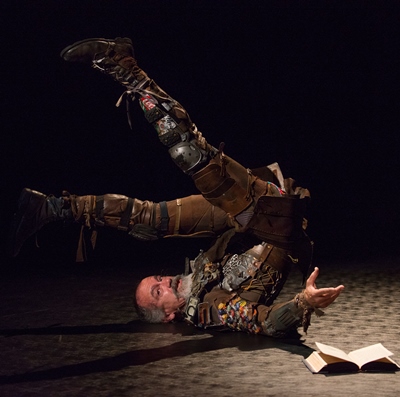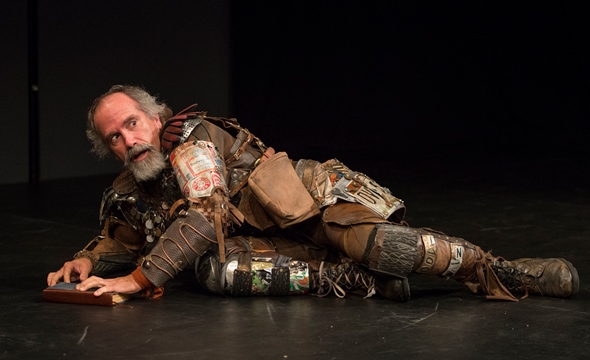‘Quixote: On the Conquest of Self’ recasts Cervantes for the young in heart (and years)
“Quixote: On the Conquest of Self,” adapted by Mónica Hoth and Claudio Valdés Kuri, at Writers Theatre through Dec. 17. ★★
By Lawrence B. Johnson
In his patched-together “battle” garb, well into his middle years but lean, bright of eye and dauntless in his self-image, Henry Godinez looks the very portrait of that most storied of knights errant, Don Quixote de La Mancha.
Godinez is the appealing star and narrator of an almost-one-man show with the intriguing title of “Quixote: On the Conquest of Self” – which turns out to be a theatrical excursion more curious than any of the ventures embarked upon by Cervantes’ noble lancer, windmill jousting included.
 Actually, this contrivance co-authored by Mónica Hoth and Claudio Valdés Kuri (who also directs) gives much the impression of assaulting windmills. We gladly enter the field as Quixote’s second, only to discover the true nature of his objective – and then, if we are more than 10 years old, we pull up short and ask in dismay: What are you doing, and why are we here?
Actually, this contrivance co-authored by Mónica Hoth and Claudio Valdés Kuri (who also directs) gives much the impression of assaulting windmills. We gladly enter the field as Quixote’s second, only to discover the true nature of his objective – and then, if we are more than 10 years old, we pull up short and ask in dismay: What are you doing, and why are we here?
Or as a sympathetic viewer observed on the way out after the performance I saw, “It would be very nice for children, but it really isn’t for adults.” Quite.
This Quixote opus is interactive. A fugitive from the pages of Cervantes’ epic novel, the knight keeps turning to the audience for assistance as he struggles for independence even as he pursues his own worthy quests. Thus he summons folks from their seats onto the stage. To the character’s, and maybe the actor’s, visible consternation, one woman at this performance turned him down flat.
But then an accommodating fellow joined Godinez in the spotlight on the bare boards to formally invest him with knighthood. All this took me back to my youth and the children’s television show “Winky Dink and You,” where I could draw ropes and ladders and other assisting devices on a thin vinyl overlay pressed onto the screen to help the cartoon hero.
At age 8, I knew why I watched “Winky Dink” every Saturday morning, but I lost that clarity pretty early in this game. Godinez was not far into his schtick – which he punctuated amply with forward tumbles – before I sensed the narrative thread and the show’s purpose evanescing before my eyes. With each succeeding request for a volunteer to help him out, the play’s dramatic veracity diminished a little more.
 Stream of consciousness can make for powerful theater. But what passes here for a narrative stream, jerked about by the physical literalism of all those tumbles, is at first merely perplexing and soon tedious.
Stream of consciousness can make for powerful theater. But what passes here for a narrative stream, jerked about by the physical literalism of all those tumbles, is at first merely perplexing and soon tedious.
At a certain point, “The Conquest of Self” goes over the edge of theatrical plausibility and down a steep hill into simplistic moralizing. I should note here that program books, packed with serious essays about this shallow enterprise, are handed out only as you leave the theater. That, I assume, is to avoid spoiling a surprise.
I won’t spoil it, either. But I must mention that fairly late in the play Godinez is joined on stage by a second actor, Emma Ladji, who becomes more like his Sancho Panza than his idealized Dulcinea. This is where “The Conquest of Self” sinks altogether into the children’s hour – or an inadvertent parody of the Miss American pageants with the classic question to reveal character and temperament: What is your fondest wish? World peace, totally.
Desperate to help the failing Quixote recover from a swoon, the lately arrived actor turned to the audience to solicit their most noble wishes – to make a spiritual connection with the knight. Sporting viewers came up with “love” and “mutual understanding” and, oh yes, “world peace.” I will not disclose the effect of these communal longings. But Quixote’s advocate appeared to be very, very grateful.
The play itself expired soon thereafter. And I was likewise very, very grateful.
Related Link:
- Performance location, dates and times: Details at TheatreinChicago.com
Tags: Claudio Valdés Kuri, Emma Ladji, Henry Godinez, Mónica Hoth


